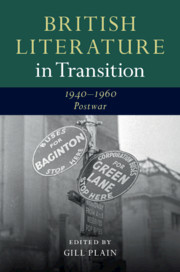Description
British Literature in Transition, 1940–1960: Postwar
British Literature in Transition Series
Coordinator: Plain Gill
Examines debates central to postwar British culture, showing the pressures of reconstruction and the mutual implication of war and peace.
Language: English
Publication date: 12-2018
438 p. · 15.9x23.5 cm · Hardback
438 p. · 15.9x23.5 cm · Hardback
Description
/li>Contents
/li>Biography
/li>
'Postwar' is both a period and a state of mind, a sensibility comprised of hope, fear and fatigue in which British society and its writers paradoxically yearned both for political transformation and a nostalgic re-instatement of past securities. From the Labour landslide victory of 1945 to the emergence of the Cold War and the humiliation of Suez in 1956, this was a period of radical political transformation in Britain and beyond, but these changes resisted literary assimilation. Arguing that writing and history do not map straightforwardly one onto the other, and that the postwar cannot easily be fitted into the explanatory paradigms of modernism or postmodernism, this book offers a more nuanced recognition of what was written and read in the period. From wartime radio writing to 1950s travellers, cold war poetry to radical theatre, magazine cultures to popular fiction, this volume examines important debates that animated postwar Britain.
Introduction Gill Plain; Part I. Aftermath: The Beginning or the End?: Introduction; 1. Slender means: the novel in the age of austerity Marina MacKay; 2. Impossible elegies: poetry in transition 1940–1960 Nigel Alderman; 3. Democracy and decentralisation: the Renaissance of British theatre? Rebecca D'Monté; 4. National transitions: Wales, Scotland and Northern Ireland Katie Gramich; 5. Heroes of austerity: genre in transition Gill Plain; 6. Wireless writing, World War II and the West Indian literary imagination James Procter; Part II. The Politics of Transition: Introduction; 7. Narrating transitions to peace: fiction and film after war Mark Rawlinson; 8. Poetry, the early Cold War and the idea of Europe Adam Piette; 9. Horizon, encounter and mid-century geopolitics Thomas S. Davis; 10. Public intellectuals and the politics of literature: the causes and collaborations of J. B. Priestley and Jacquetta Hawkes Priestley Ina Habermann; 11. Prizing the nation: postwar children's fiction Lucy Pearson; 12. Artists of their time: the postwar battle for realism in literature and painting Alice Ferrebe; Part III. Reconfigurations: Introduction; 13. Demob: the postwar origins of the new nature writing Leo Mellor; 14. Old haunts: childhood and home in postwar fiction Victoria Stewart; 15. New uses of literacy: the blank page and writing in the aftermath of war Tracy Hargreaves; 16. The pursuit of love: writing postwar desire Charlotte Charteris; 17. Creating vital theatre: new voices in a time of transition Claire Cochrane; Part IV. No Directions: Introduction; 18. Covert legacies in postwar British fiction James Smith; 19. 'The sights are worse than the journeys': travel writing at the mid-century Petra Rau; 20. The future and the end: imagining catastrophe in mid-century British fiction Allan Hepburn; 21. Exhausted literature: the postwar novel in repose Kate McLoughlin.
Gill Plain is Professor of English at the University of St Andrews, Scotland. She has research interests in British literature and culture of the 1940s, war writing, crime fiction, British cinema, feminist theory and gender studies. Her publications include Women's Fiction of the Second World War (1996), Twentieth-Century Crime Fiction (2001), Ian Rankin's 'Black and Blue': A Reader's Guide (2002), John Mills and British Cinema: Masculinity, Identity and Nation (2006) and Literature of the 1940s: War, Postwar and 'Peace' (2013). She has also edited a number of volumes including A History of Feminist Literary Criticism (co-edited with Susan Sellers, Cambridge, 2007) and Scotland and the First World War: Myth, Memory and the Legacy of Bannockburn (2016). She is General Editor of the British Literature in Transition series.
© 2024 LAVOISIER S.A.S.




